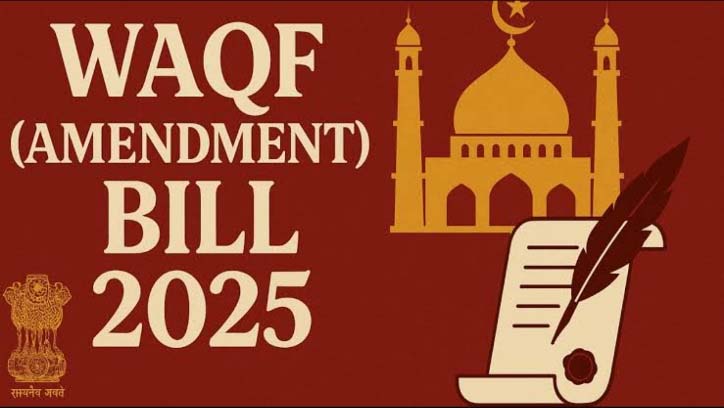
Bhopal Digital Desk : The Waqf Act, 2025, marks a pivotal move toward improving the oversight of Waqf properties across India. Grounded in Islamic principles, Waqf denotes a charitable endowment established by a Muslim for purposes like constructing mosques, educational institutions, healthcare facilities, or other community-focused establishments. A Waqf property cannot be transferred, gifted, inherited, or burdened once designated as Waqf.
Issues in Waqf Property Administration -
For years, mismanagement, corrupt practices, and operational inefficiencies have hindered Waqf properties from fulfilling their goal of supporting disadvantaged communities. The Waqf (Amendment) Act, or Unified Waqf Management, Empowerment, Efficiency, and Development (UMEED) Act,2025, aims to resolve these problems by implementing reforms to boost transparency, accountability, and effectiveness in Waqf administration..
Promoting Transparency and Curbing Corruption
A critical challenge has been the opacity surrounding Waqf property management, fostering corruption and financial irregularities for years. The Act tackles this by requiring the digitization of all Waqf records, enabling accessible and real-time oversight. A unified digital platform will monitor Waqf assets, preventing unauthorized dealings and ensuring funds are dedicated to community welfare.
Resolving Legal Conflicts and Encroachments
Ongoing legal battles and disputes over land encroachments and ownership claims have long plagued Waqf properties, with thousands of cases unresolved. The bill imposes tighter rules to prevent the improper designation of properties as Waqf, a practice sparking disputes in states like Tamil Nadu, where a farmer in Thiruchenthurai village faced restrictions on selling his land due to Waqf Board claims over the village. Comparable issues in Bihar, Kerala, Karnataka, and Uttar Pradesh have impacted numerous households. By addressing these conflicts, the bill protects property rights while upholding the sanctity of Waqf institutions.
Advancing Muslim Women’s Welfare
The amendment places a strong emphasis on supporting Muslim women, especially widows and divorcees, through self-help groups and programs fostering financial autonomy. It ensures women have greater representation on Waqf Boards and backs efforts like scholarships for girls, skill-training initiatives, and legal support for inheritance and domestic violence cases. These measures aim to make Waqf governance more inclusive and attuned to community needs.
Improving Access to Healthcare
The bill also prioritizes healthcare for underserved populations. By optimizing Waqf property management, additional resources can fund clinics, hospitals, medical assistance programs, and essential medications in neglected areas. It encourages collaborations with charitable entities to broaden healthcare access, ensuring Waqf assets directly enhance public well-being.
Strengthening Education and Skill-Building
Education is vital for uplifting marginalized groups, and the bill supports the development and upkeep of schools and madrassas, providing scholarships and aid to students from low-income families. It also fosters vocational training centers to equip youth with employable skills, boosting their job prospects and financial security.
Meeting Housing Demands
Addressing housing challenges is another focus of the bill. Many low-income families struggle to secure adequate shelter, and Waqf properties can help bridge this gap. The amendment permits Waqf Boards to allocate specific properties for affordable housing, homeless shelters, and subsidized rentals for economically disadvantaged groups, ensuring Waqf resources tackle pressing societal needs rather than remaining idle or encroached.
Fostering Economic Independence
The reform champions economic self-reliance by supporting skill-building programs, microfinance, and loans for small businesses to empower individuals financially. Through entrepreneurship and job-creation initiatives, the amendment ensures Waqf properties drive economic progress and independence within communities.
Combating Unauthorized Occupation of Waqf Assets
Unauthorized occupation remains a pressing issue, with approximately 58,898 Waqf properties illegally held, as reported by the Waqf Assets Management System of India (WAMSI) portal. The bill introduces robust legal mechanisms to recover encroached lands and safeguard Waqf assets from unlawful use. District collectors will gain enhanced powers to enforce these protections, ensuring Waqf properties serve their intended community-focused purposes.
Ensuring Diverse Representation in Waqf Governance
The bill promotes fairness and inclusivity in resource allocation by ensuring representation from various Muslim communities, including Bohra and Aghakhani groups, and requiring members from backward classes on State and Central Waqf Boards. It also mandates the inclusion of two non-Muslim members to strengthen transparency and accountability.
By overhauling the legal and administrative structure of Waqf management, the Waqf
(Amendment) Act, 2025, creates a just and transparent framework that prioritizes social welfare, economic empowerment, and community progress. The Waqf Boards and Central Waqf Council focus on regulatory oversight rather than religious matters, ensuring legal adherence and public interest. The Act will not harm Muslim interests as non-Muslims cannot interfere in the Waqf Board’s affairs as its management, creation, and beneficiaries would remain exclusively Muslims.Through accountability measures, stakeholder empowerment, and better governance, the bill sets the stage for a forward-thinking and efficient Waqf system in India.
Nisar Ahmad IAS(retd)
ex CEO and Administrator, M.P Waqf Board
ex Secretary M.P Minorities commission,Bhopal


 हाई सिक्योरिटी रजिस्ट्रेशन नंबर प्लेट होना अनिवार्य! नहीं लगी तो लगेगा दस हजार रुपए का जुर्माना और जेल की हवा अलग से
हाई सिक्योरिटी रजिस्ट्रेशन नंबर प्लेट होना अनिवार्य! नहीं लगी तो लगेगा दस हजार रुपए का जुर्माना और जेल की हवा अलग से 